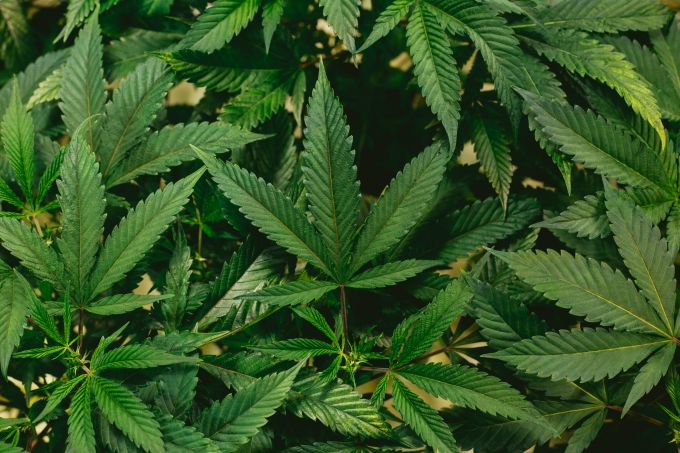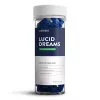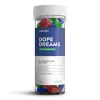You’ve probably already heard of CBD and THC, but what about THCV products? This compound, only recently entering the spotlight and being used at its full potential, has already begun to change the cannabis landscape.
But, what is THCV? Will it get you high? What are its benefits? With so much curiosity surrounding THCV, we’re here to provide the answers! So, if you’ve been wondering, “What is THCV?”—let’s explore it together.
THCV Guide: Understanding This Unique Cannabinoid
THCV was first identified in 1971, alongside Cannabidivarin (CBDV). While it is structurally similar to tetrahydrocannabinol (THC), its origins are quite different. Despite following a somewhat comparable synthesis process, THCV is derived from a distinct precursor.
Unlike THC and CBD, which originate from CBGA (cannabigerolic acid), THCV is synthesized through a different pathway.
Instead of olivetolic acid, its formation begins when geranyl pyrophosphate combines with divarinolic acid, leading to the production of CBGVA. Once this compound undergoes decarboxylation and enzymatic modification by THCV synthase, it transforms into THCV.
Feeling overwhelmed? Don’t worry—it all starts making sense soon!
So, what is THCV? In simple terms, it’s a cannabinoid that sets itself apart from THC due to a missing two-carbon chain. While THC has a five-carbon side chain attached to its molecular ring, THCV has a shorter, three-carbon propyl group.
THCV interacts with the endocannabinoid system in a unique way. It behaves as an antagonist to CB1 receptors, meaning it blocks some of THC’s effects, such as appetite stimulation.
On the other hand, it acts as an agonist to CB2 receptors, which are linked to immune response and inflammation regulation.
And that’s just a glimpse into the science behind what makes THCV such an intriguing compound!

The Benefits of THCV
THCV has earned nicknames like “Diet Weed” and “Weederrall” due to its ability to curb appetite and boost energy levels.
While most cannabis strains are known for inducing the munchies, THCV takes a different approach—helping users feel more energized and less hungry.
When considering “What is THCV?”, these quirky names may not immediately come to mind, but they highlight one of its most intriguing effects. Unlike THC, which often triggers cravings, THCV is unique in its potential to support weight management.
Is THCV an Energizing Sativa or a Relaxing Indica?
When exploring the benefits of THCV, it’s important to ask—why does this cannabinoid behave so differently from others like CBD, Delta 8, and Delta 9 products?
Most cannabis compounds are associated with relaxation and sedation, often enhancing appetite and inducing a laid-back state.
THCV, however, breaks the mold. Instead of promoting deep relaxation, it boosts energy levels, much like Delta 10 products.
This is why THCV-rich strains tend to be sativa-dominant, delivering uplifting effects that enhance focus, creativity, and motivation.
Some of the most well-known THCV strains include:
- Doug’s Varin
- Pineapple Purps
- Malawi Gold
While sativas dominate the THCV lineup, a few indica strains do contain this cannabinoid. However, the most potent THCV experiences typically come from energizing sativa varieties.

THCV and Its Effects on the Human Body
While it’s important to clarify that no cannabinoid, including THCV, is a proven treatment or cure for any medical condition, early research suggests it may have some fascinating potential.
One of its most notable effects is its ability to increase glucose sensitivity by blocking CB1 receptors. But what exactly does that mean?
Studies have indicated that THCV may play a role in glucose regulation. In one particular study involving mice, researchers found that THCV helped improve glucose tolerance in both genetically obese mice and those with diet-induced obesity.
In both cases, THCV encouraged greater energy expenditure by promoting glucose uptake.
Although this research is still in its early stages and has only been tested in animal models, the findings are promising.
Since glucose insensitivity is a major factor in obesity-related metabolic issues, THCV’s ability to regulate glucose levels suggests it could have long-term metabolic benefits—something that continues to excite researchers and cannabis enthusiasts alike.
Further Research on THCV
Ongoing studies suggest that THCV and other cannabinoids may offer a range of potential benefits.
Among the more recent findings, scientists have discovered that THCV might contribute to fibroblast formation through resorption—a process essential for tissue regeneration. However, this research is still in its early stages and requires further investigation.
Another intriguing area of study is THCV’s possible role in bone health. While the exact mechanisms remain unclear, preliminary research suggests that THCV could influence bone growth, at least in laboratory settings involving rats.
One study found that CB2 receptors are highly concentrated in osteoblasts and osteoclasts, the cells responsible for bone formation and resorption.
Additionally, researchers noted that CB2 receptors outnumber CB1 receptors in synovial joints, the areas where bones meet.
In another experiment, mice that lacked CB2 receptors were found to have a higher risk of developing osteoporosis, suggesting that CB2 activation may play a role in maintaining bone density.
What does all this mean for THCV users?
While you won’t find THCV edibles that magically promote bone growth, these findings highlight an exciting potential for future therapeutic applications.
With more extensive research, scientists may uncover even more remarkable benefits of this cannabinoid in the years to come.
THCV’s Potential Role in Inflammation
Does THCV combat inflammation? Not yet—but research is showing promise.
Inflammation is the body’s natural defense mechanism, triggered in response to foreign invaders like bacteria, viruses, and injuries. While it plays a crucial role in healing, chronic inflammation can lead to pain and is a key factor in autoimmune disorders such as Myasthenia Gravis.
Emerging studies suggest that THCV might help regulate inflammation by interacting with the body's endocannabinoid system.
Specifically, researchers believe THCV blocks CB1 receptors while activating CB2 receptors, a combination that could contribute to anti-inflammatory effects.
While THCV gummies on the market today won’t directly treat inflammation, early experiments in mice have shown reduced inflammatory responses and improved pain relief following THCV administration.
Though these findings are preliminary, they lay the groundwork for future research—meaning THCV may eventually become a valuable tool for managing inflammation-related conditions.
THCV and Appetite Suppression
Research suggests that THCV may help regulate appetite and support weight management, making it a cannabinoid of interest for those looking to maintain a healthy diet.
Often referred to as “Diet Weed,” THCV has gained attention for its ability to reduce food cravings and enhance feelings of fullness.
Unlike THC, which is known for stimulating hunger (AKA— giving you the munchies), THCV works in the opposite direction.
Studies indicate that it may suppress appetite, increase satiety, and enhance glucose metabolism. By promoting the conversion of glucose into ATP—the body’s primary energy source—THCV helps encourage fat burning rather than fat storage.
On a biological level, THCV also appears to improve insulin sensitivity in liver cells (hepatocytes), which plays a crucial role in regulating hunger signals.
This means that, rather than intensifying food cravings like THC, THCV helps the body maintain balanced energy levels—a potential game-changer for metabolic health.
THCV’s Interaction with THC: A Balancing Effect
THC is the primary psychoactive component in cannabis, activating both CB1 and CB2 receptors.
While it is responsible for many sought-after effects, it can also lead to unwanted side effects such as paranoia, short-term memory impairment, and anxiety-like symptoms in some users.
THCV, on the other hand, appears to counterbalance certain effects of THC.
When taken together, THCV’s CB1-blocking properties may help reduce THC’s more intense or undesirable effects—such as excessive hunger or cognitive fog—without completely diminishing its psychoactive potential.
However, while preliminary findings suggest THCV can modulate THC’s effects, more extensive studies with larger sample sizes and varying THC doses are needed. Until then, it remains uncertain how consistently THCV can dull THC’s impact across different individuals.
Additional Potential Benefits of THCV
Beyond its known effects on appetite suppression, metabolism, and THC modulation, THCV may offer additional advantages. Users and early research suggest that this cannabinoid could also contribute to:
- Increased Energy
- Enhanced Focus
- Boosted Creativity
While more research is needed to fully understand the extent of THCV’s benefits, its potential as a performance-enhancing and focus-boosting cannabinoid is generating excitement in the cannabis community.

Does THCV Get You High? Yes, But Only at High Doses
The psychoactive nature of THCV is a topic of debate because its effects on cannabinoid receptors are more complex than they initially seem.
Unlike THC, which consistently activates CB1 receptors to produce a high, THCV interacts with these receptors in a dose-dependent manner.
At low doses, THCV blocks CB1 receptors, meaning it won’t cause any noticeable psychoactive effects. In fact, as previously stated, when present in small amounts alongside THC, THCV may actually reduce the intensity of a typical THC high.
However, research suggests that at higher doses, THCV stops blocking CB1 and starts activating it, leading to mild psychoactive effects.
So, can THCV get you high? Yes—but only in significant amounts, and the experience is likely to be much shorter and more stimulating than a THC high.
Some reports suggest that THCV acts quickly but fades just as fast, much like a burst of energy rather than a prolonged euphoria.
Because of its scarcity, THCV’s psychoactive effects remain less studied than THC’s, but it has been found in higher concentrations in African, Indian, Thai, Chinese, and Afghan cannabis strains.
Some researchers believe that natural selection may have favored THC over THCV due to THCV’s tendency to counteract THC’s effects.
THCV and Drug Testing
While THCV is chemically distinct from THC, it may still show up on drug tests, particularly if consumed in large quantities.
If taken in small doses or as part of a formulated product, it is less likely to trigger a positive result—but this is not guaranteed. As with all cannabinoids, individual metabolism and testing sensitivity play a role in whether THCV will be detected.
Is THCV Psychoactive?
THCV primarily functions as a CB1 antagonist at low doses, meaning it won’t produce psychoactive effects in small amounts.
In fact, it can help counteract THC-induced hunger, making it useful for those looking to avoid the munchies while still enjoying cannabis.
When combined with THC, THCV may provide a more balanced, smoother experience without the intense cravings that often accompany THC consumption.
However, at higher doses, THCV switches from a CB1 antagonist to an agonist, meaning it begins to act similarly to THC.
Unlike THC, though, THCV’s psychoactive effects are often described as clear-headed, energizing, and mentally stimulating, rather than the more sedative or foggy high associated with THC.
Many users report that THCV enhances focus and cognitive function, making it a unique alternative for those who enjoy the psychoactive side of cannabis without the mental cloudiness.

How Does THCV Compare to Other Cannabinoids?
To truly understand “What is THCV?”, it’s helpful to compare it with other well-known cannabinoids. Although cannabinoids may have similar structures, small molecular differences result in distinct effects on the body and mind.
THCV stands out due to its unique impact on appetite, energy levels, and psychoactivity compared to other compounds like CBD, Delta 9, Delta 10, and Delta 8 products.
Below is a comparison of THCV and other major cannabinoids based on their effects:
|
Cannabinoid |
Effects on CB1 & CB2 Receptors |
Appetite Impact |
Psychoactivity |
Additional Effects |
|---|---|---|---|---|
|
THCV |
Antagonist at CB1 (low doses), Agonist at CB1 (high doses), Agonist at CB2 |
Suppresses appetite, boosts metabolism |
Mildly psychoactive at high doses, fast onset, short duration |
Increases energy, enhances focus, promotes mental clarity |
|
Delta 10 |
Activates CB1 and CB2 receptors |
Neutral effect on appetite |
Mildly psychoactive, uplifting |
Energizing, often compared to sativa effects |
|
Delta 9 |
Partial agonist at CB1 and CB2 |
Stimulates appetite, causes munchies |
Highly psychoactive, strong euphoria |
Can cause relaxation or anxiety, depending on strain |
|
Delta 8 |
Partial agonist at CB1 and CB2 |
Stimulates appetite |
Mildly psychoactive, more relaxing than Delta 9 |
Often leads to sedation, promotes calmness |
|
CBD |
Indirectly influences CB1 and CB2, does not directly activate them |
Neutral on appetite |
Non-psychoactive |
Supports relaxation, pain relief, and inflammation reduction |
Key Takeaways
- THCV is unique among cannabinoids for its ability to reduce appetite rather than increase it.
- Unlike most THC variants, THCV is not strongly psychoactive—it only induces a mild high at high doses.
- THCV’s effects resemble an energy booster, making it more similar to Delta-10 than the more relaxing Delta-8 or sedating Delta-9.
- CBD remains entirely non-psychoactive, whereas THCV can have mild psychoactive effects at higher doses.
THCV’s distinct profile makes it one of the most exciting cannabinoids to watch, as it offers potential benefits for weight management, mental clarity, and energy enhancement—without the heavy sedation or strong psychoactive effects commonly associated with THC.
How Does THCV Make You Feel?
The effects of THCV largely depend on the dosage. Unlike traditional THC, which is often associated with relaxation or sedation, THCV produces more stimulating and appetite-suppressing effects. Users commonly report experiencing:
- Motivation
- Alertness
- Focus
- Satiety
- Energy Boost
- Clear-headedness
At lower doses, THCV primarily reduces appetite and promotes a mild energy boost. It doesn’t produce a psychoactive high at these levels.
However, at higher doses, THCV’s cognitive-enhancing effects become more pronounced, delivering a sharp, clear-headed experience that can feel mentally refreshing and stimulating.
What Else Should You Know About THCV?
THCV is rare in cannabis plants, making its extraction more challenging than other cannabinoids like THC and CBD.
Although its production process follows a similar path, THCV starts as THCVA (tetrahydrocannabivarinic acid), which converts into THCV when exposed to heat through decarboxylation.
The THCV content in cannabis plants depends on environmental factors such as:
- Sun exposure
- Climate
- Humidity levels
- Genetics of the strain

While the ideal conditions for maximizing THCV production remain uncertain, the highest concentrations are typically found in African landrace strains.
How Potent is THCV?
THCV’s potency depends on how it is used:
- For appetite suppression and energy enhancement, THCV is effective at low doses.
- For psychoactive effects, doses above 10mg are typically required. Even then, the high is short-lived compared to THC.
Because THCV is still relatively rare in commercial products, its full potential is yet to be fully explored—but its unique effects on appetite, energy, and focus make it an exciting cannabinoid to watch.
The Legal Status of THCV
THCV is federally legal in the United States as long as it is derived from hemp and contains less than 0.3% THC, aligning with the 2018 Farm Bill regulations.
Currently, 38 states permit the sale and consumption of THCV, though regulations may vary depending on how it is sourced and marketed.
At the state level, THCV is generally allowed wherever medical cannabis is legal. However, due to its potential psychoactive effects at higher doses, THCV is typically restricted to adult use.
Final Thoughts: The Future of THCV
THCV is a unique THC analog with potential benefits for appetite suppression, energy enhancement, and metabolic regulation.
While researchers are particularly interested in its possible applications for obesity and diabetes management, further studies are needed to confirm these effects in humans.
Due to THCV’s limited availability, large-scale research has been slow, but growing consumer interest could encourage more extensive clinical trials.
At low doses, THCV suppresses THC’s psychoactive effects, making it appealing for those seeking cannabis benefits without strong euphoria.
However, at higher doses, THCV itself can induce a mild and short-lived high.
As more research emerges and production methods improve, THCV could become a major player in the cannabinoid market, offering a distinctive alternative to traditional THC and CBD products.








